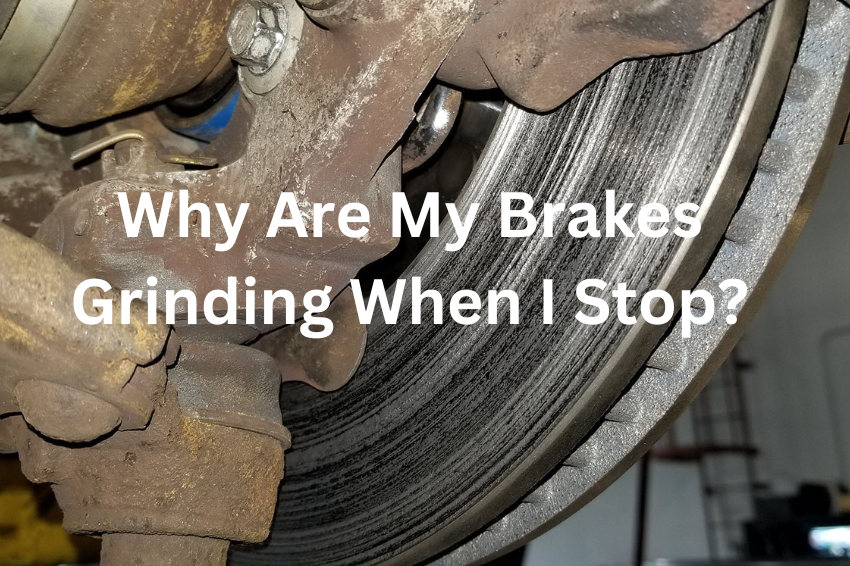“Grinding brakes during stops means worn-out brake pads. These pads press against your car’s disc to slow down. When worn thin, metal rubs against metal, causing the noise.”
What Are The Different Causes Of Grinding Brakes?
Hearing a grinding noise when you brake can be unsettling.
While worn-out brake pads are a common cause, several other issues can cause this problem.
Here are some potential causes:
- Worn Brake Pads: These pads are like a shoe for your car, pressing against a disc (rotor) to slow down.
Over time, they wear thin.
When this happens, metal from the pad rubs against the metal disc, creating a grinding sound.
This is a serious issue and requires a mechanic to replace the pads to ensure safe braking.
- Foreign Object in Brakes: Sometimes, pebbles or other debris can get lodged between the brake pad and disc.
This can cause a grinding noise, especially when you apply the brakes lightly.
You might be able to remove the object yourself by carefully inspecting the brakes.
However, if the noise persists, see a mechanic to rule out any damage.
- Rusted Brakes: If your car hasn’t been driven in a while, the brake discs might develop rust.
This rust can cause a grinding or scraping noise, especially during the first few brakes after starting the car.
Usually, this goes away on its own after driving for a bit.
Yet, persistent grinding might indicate deeper rotor damage requiring a mechanic’s attention.
- Seized Caliper: The caliper is the part that squeezes the brake pads against the disc.
In rare cases, the caliper can malfunction and seize, causing continuous contact between the pad and disc.
This can lead to grinding and overheating.
It is a severe issue that requires immediate repair by a mechanic.
- Low Brake Fluid: Brake fluid is essential for transmitting pressure to the brakes.
If the fluid level is low, it might not apply enough pressure to the pads, causing them to grind against the disc instead of gripping it properly.
While topping off brake fluid might seem like a simple solution, it’s recommended to see a mechanic to diagnose the cause of the low fluid level, which could indicate a leak in the brake system.
Is It Safe To Drive With Grinding Brakes?
No, grinding brakes are a sign that something is wrong with your car’s braking system, and it’s not safe to drive with them for long.
While it might be tempting to keep driving, it’s important to understand the risks involved.
In the worst-case scenario, continued grinding can lead to complete brake failure.
This means the brakes might not respond at all when you press the pedal, leaving you with no control over stopping the car.
This is a terrifying situation that can potentially cause accidents.
However, the severity of the grinding will determine how urgently you need a repair.
Loud and constant grinding is a serious red flag.
In such cases, it’s best to pull over to a safe location immediately and call for a tow truck or have your car hauled to a mechanic.
This could indicate significant damage to the brake pads, rotors, or even the calipers, requiring immediate attention from a professional.
However, if the grinding noise is faint and occurs only occasionally, you might be able to limp your car to a nearby mechanic with extreme caution.
This should only be considered for a very short distance, like driving across town for a repair.
Remember, even seemingly minor grinding can quickly worsen and lead to bigger problems.
The safest course of action is always to prioritize your safety and the safety of others on the road.
Don’t hesitate to get your brakes checked by a qualified mechanic as soon as possible.
They can diagnose the issue, recommend the necessary repairs, and ensure your car’s braking system is functioning optimally, giving you peace of mind on the road.
How To Prevent Brakes From Grinding?
The good news is there are steps you can take to prevent grinding brakes from happening in the first place.
Here are some key practices that will help extend the life of your brakes and keep your car running smoothly:
Master the Gentle Brake:
Aggressive braking, like slamming on the brakes for every stop sign, puts excessive wear on your brake pads.
Instead, practice smooth and controlled braking whenever possible.
Anticipate stops and gradually apply pressure to the brake pedal.
This reduces friction and heat buildup, making your brake pads last longer.
Mind the Weight:
The heavier the load you carry, the harder your brakes need to work.
Avoid overloading your car, especially for frequent trips.
This not only improves fuel efficiency but also reduces stress on your braking system.
Don’t Ride the Brakes:
If you’re coming down a steep hill, don’t constantly press down on the brake pedal to maintain a slow speed.
This can overheat your brakes and lead to premature wear.
Rather, use engine braking by shifting into a lower gear to control your speed.
Listen to Your Car:
Pay attention to any warning signs your car might be giving you.
A soft grinding noise or a vibrating brake pedal could indicate minor issues that can be addressed before they become major problems.
Schedule regular brake inspections with a qualified mechanic to ensure your braking system is in top condition.
Follow the Owner’s Manual:
Your car’s manual is a valuable resource.
It will often recommend specific maintenance intervals for your brakes, including how often to get them checked and replaced.
Refer to your manual for the recommended schedule and stick to it for optimal brake performance.
